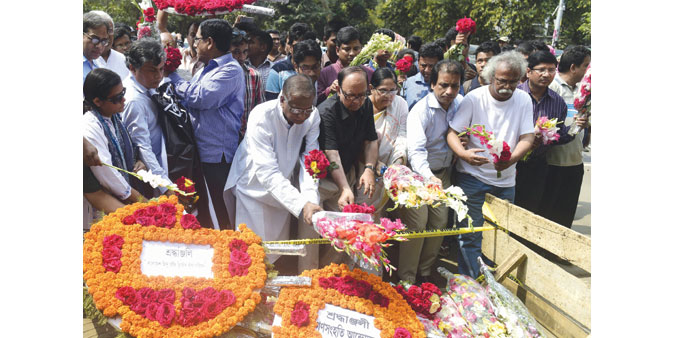Relatives and friends pay their last respects to US blogger of Bangladeshi origin and founder of the Mukto-Mona (Free-mind) blog site Avijit Roy in Dhaka yesterday, after he was hacked to death by unidentified assailants in the Bangladeshi capital on February 26.
Reuters/AFP
Dhaka
Bangladeshis gathered yesterday to pay tribute to an American blogger and critic of religious extremism who was hacked to death in Dhaka, in the latest of a series of attacks on writers in the Muslim-majority nation.
Avijit Roy, a US citizen of Bangladeshi origin, was killed by machete-wielding assailants on February 26, while returning from a book fair.
His wife and fellow blogger Rafida Ahmed suffered head injuries and lost a finger. She remains in hospital in a serious condition.
The attack came amid a crackdown on hardline Islamist groups, which have increased activities in recent years in the South Asian nation of 160mn people.
Mourners gathered with flowers yesterday to pay their respects to Avijit, who was in his native city on a visit from the United States.
Students, professors and writers were among those laying flowers on Avijit’s coffin, placed in the grounds of Dhaka
University.
“Free thinking in Bangladesh is becoming a great danger, all the free thinkers are at great risk,” writer Shahriar Kabir said.
“We want to know why the government failed to ensure the safety of him, despite knowing that he had been facing threats from the Islamist radicals.”
No arrests have been made. A demonstration was also held at the spot where Avijit was killed. Protesters chanted slogans demanding the “immediate arrest and quick trial of the
perpetrator”.
Avijit’s family said Islamist radicals had been threatening him because he maintained a blog, “Mukto-mona,” or “Freemind,” that highlighted humanist and rationalist ideas and
condemned religious extremism.
“An Islamist militant group is behind the murder. The fundamentalists were threatening to kill him,” Avijit’s father Ajoy Roy said at the gathering.
“I am speechless at this moment of mourning. When the fundamentalists threatened, I informed the Inspector General of Police and Deputy Inspector General of Police,” Roy added.
“This murder has proved their utter failure.”
“It’s a heinous murder. My question is, why did it take place?” Kamal Hossain, the architect of Bangladesh’s secular constitution, told reporters as Roy’s father stood by.
“Avijit was killed because of his writing. By killing him, the killers have torn apart our
constitution,” he said.
US State Department spokeswoman Jen Psaki called it “a shocking act of violence” that was “horrific in its brutality and cowardice”.
In 2013, religious extremists targeted several secular bloggers who had demanded capital punishment for Islamist leaders convicted of war crimes during Bangladesh’s war for
independence.
Blogger Ahmed Rajib Haider was killed that year in a similar attack near his home in Dhaka after he led one such protest demanding capital punishment.
In 2004, Humayun Azad, a secular writer and professor at Dhaka University, was also attacked by militants while returning home from a Dhaka book fair. He later died in Germany while undergoing treatment.
Media group Reporters Without Borders rated Bangladesh 146th among 180 countries in a ranking of press freedom
last year.
FBI TO PROBE MURDER: The Bangladesh government has accepted the US offer to engage its Federal Bureau of Investigation (FBI) to investigate the
brutal murder of Roy.
Foreign Minister Abul Hassan Mahmood Ali conveyed the decision to a group of Dhaka-based diplomats including the Americans, while briefing them on the ongoing political situation
yesterday.
The foreign ministry said he shared “the government’s decision to positively respond to the US offer to engage the FBI in unearthing the motive and real
culprits behind the murder.
The US has condemned the killing in “strongest terms” and offered support in the
investigations.
The minister in the briefing, part of his “regular engagements” with the diplomats, noted in particular the concerns raised by the UN, US and EU after the killing of the blogger by
unidentified assailants.
Ali briefed them the “latest trends in the violent and terrorist acts being perpetrated by the BNP-Jamaat combine since January 5”.
The foreign ministry said the envoys at the briefing reiterated their concern over the continued violence.
They underscored the need for the people of Bangladesh to find a solution to the prevailing
situation.
The envoys called for the return of calm and stability in order to sustain the momentum of Bangladesh’s impressive socio-economic development gains.

